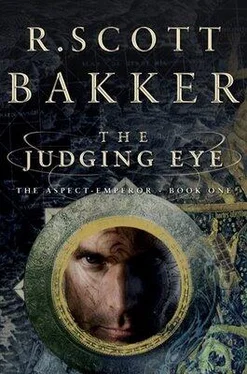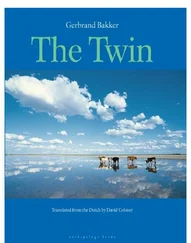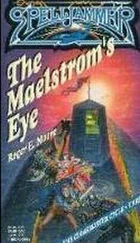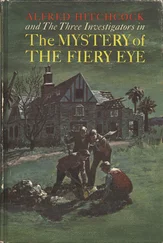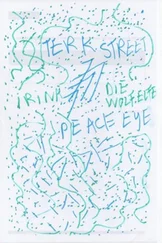R. Bakker - The Judging eye
Здесь есть возможность читать онлайн «R. Bakker - The Judging eye» весь текст электронной книги совершенно бесплатно (целиком полную версию без сокращений). В некоторых случаях можно слушать аудио, скачать через торрент в формате fb2 и присутствует краткое содержание. Жанр: Фэнтези, на английском языке. Описание произведения, (предисловие) а так же отзывы посетителей доступны на портале библиотеки ЛибКат.
- Название:The Judging eye
- Автор:
- Жанр:
- Год:неизвестен
- ISBN:нет данных
- Рейтинг книги:5 / 5. Голосов: 1
-
Избранное:Добавить в избранное
- Отзывы:
-
Ваша оценка:
- 100
- 1
- 2
- 3
- 4
- 5
The Judging eye: краткое содержание, описание и аннотация
Предлагаем к чтению аннотацию, описание, краткое содержание или предисловие (зависит от того, что написал сам автор книги «The Judging eye»). Если вы не нашли необходимую информацию о книге — напишите в комментариях, мы постараемся отыскать её.
The Judging eye — читать онлайн бесплатно полную книгу (весь текст) целиком
Ниже представлен текст книги, разбитый по страницам. Система сохранения места последней прочитанной страницы, позволяет с удобством читать онлайн бесплатно книгу «The Judging eye», без необходимости каждый раз заново искать на чём Вы остановились. Поставьте закладку, и сможете в любой момент перейти на страницу, на которой закончили чтение.
Интервал:
Закладка:
For years, the New Empire groaned beneath the demands of their holy sovereign's prophecy. Tithes of food were exacted from all the provinces. Vast granaries were constructed above the third cataract of the Vindauga River. Herds of sheep and cattle were driven northward, along coastal trails that soon became favourite topics for court minstrels. In the Home City, mathematicians scribbled indentures, summons, requisitions, and Kings and Judges seized what was needed in faraway lands. The records were stored in great mud-brick warehouses and cared for with the fastidiousness of religious ritual. Everything was numbered.
The call to arms did not come till the last.
Across the Three Seas the Zaudunyani took up the Circumfix, the holy symbol of their Aspect-Emperor: the knights of Conriya, masked and long-skirted, the disciplined columnaries of Nansur, the axmen of Thunyerus, wild-haired and ferocious, the peerless horsemen of Kian, and on and on. The sons of a dozen nations converged on Oswenta, the hoary old capital of Galeoth, bearing rough-painted or finely wrought representations of the Tusk and Circumfix. The sorcerous Schools sent their contingents as well: the haughty magi of the Scarlet Spires, borne in their silk-panelled litters, the dour witches of the Swayal Compact, the robed processions of the Imperial Saik, and, of course, the Gnostic sorcerers of the Mandate, who had been raised from fools to priests by the coming of the Warrior-Prophet.
The children of Oswenta marvelled. In streets choked with newcomers, they saw Nilnameshi princes in their palanquins, Ainoni Count-Palatines with their white-painted retinues, religious madmen of every description, and once, even a towering mastodon that sent horses bolting like dogs. They saw all the ornament, all the pomp and demonstration of ancient and faraway customs, thrown together and made a carnival. The bowl of each nation had spilled, and now their distinct and heady flavours swirled together, continually surprising the palette with some unheard-of combination. Long-bearded Tydonni throwing the number-sticks with wire-limbed Khirgwi. Kutnarmi monkeys climbing the gowns of Shigeki witches.
A summer and an autumn passed organizing the host. Though a generation had come and gone, the Aspect-Emperor and his advisers remembered well the lessons of the First Holy War. The Unification Wars, with their setbacks and victories and butchered cities, had produced a corps of shrewd and ruthless Zaudunyani officers, all of whom were made Judges and granted the power of life and death over the faithful. Trespasses were not forgiven-too much hung in the balance for the Shortest Path not to be taken. Mercy required a certain future, and for Men, there was none. Two Consult skin-spies were discovered, thanks to the divine insight of the Aspect-Emperor and his children. They were flayed before booming, riotous masses.
The Great Ordeal wintered at the headwaters of the Vindauga River, in the city of Harwash, which had been an entrepot for the Twelve-Pelt Road, the famed caravan route connecting Galeoth to the ancient and isolate cities of Sakarpus and Atrithau, but was now little more than a vast barracks and supply depot. The season was hard. Despite all the precautions, dread Akkeдgni, Disease, fondled the host with his Many Hands, and some twenty thousand souls were lost to a version of lung-plague common to the humid rice plains of Nilnamesh.
It was, the Aspect-Emperor explained, but the first of many tests.
The days began to thaw what the nights yet froze. Preparations intensified. The order to march was a fervent occasion of tears and joyous shouts. There is a taste to these things. The wills of men coalesce, become one, and the air knows. The God did not only create the created, He created the act of creation as well, the souls that dwell within men. Should it be any surprise that the world of things answered the world of intents? The Great Ordeal marched, and the very earth, rising from dreary winter slumber, bent knee and rejoiced. The Men of the Ordeal could feel it: an approving world, a judging world.
The host advanced in two stages. King Saubon of Caraskand, one of the Holy War's two Exalt-Generals, marched first, taking the quicker elements of the host-the Kianene, the Girgashi, the Khirgwi, and the Shrial Knights-and none of the slower, which included the sorcerous Schools. The Aspect-Emperor's second eldest son, Anasыrimbor Kayыtas, rode with him, leading the famed Kidruhil, the most celebrated heavy calvary cohort in the Three Seas. The Sakarpic host melted away before them, leaving only several companies of Long-Riders, their fleet and devious skirmishers, to harass their advance. The decisive engagement the Exalt-General hoped for never happened.
King Proyas of Conriya, the Ordeal's other Exalt-General, followed with the bulk of the host. Jubilant, the Men of the New Empire marched into the Kathol Passes, which formed the armature of two great mountains ranges, the Hethantas to the west and the Osthwai to the east. The column was too long for any real communication between its forward and rear elements-no rider could press through the masses quickly enough. The scarps climbed to either side, stacked to the timberline.
It snowed the fourth night, when the priests and judges led ceremonies commemorating the Battle of the Pass, where an ancient alliance of refugee Men and the Nonmen of Cil-Aujas had defeated the No-God in the First Apocalypse, so purchasing the World a year of precious respite. Nothing was said of the subsequent betrayal and the extermination of the Nonmen at the hands of those they had saved.
They sang of their devotion, the Men of the Ordeal, heartbreaking hymns composed by the Aspect-Emperor himself. They sang of their own might, of the doom they would deliver to the faraway gates of their enemy. They sang of their wives, their children, about the smaller pockets of the wider world they marched to save. In the evenings, the great bell they called the Interval tolled, and the Singers cried out the calls to prayer, their sweet voices rising across the far-flung fields of tents and pavillions. Hard men shed their gear and gathered beneath Circumfix banners. Noble knelt with slave or menial. The Shrial Priests gave their sermons and benedictions, and the Judges watched.
They spent several days filing through the final stages of the Pass, then descended the sill of the mountains. They crossed the thawing fields of Sagland, where the retreating Sakarpi had burned anything that could be of use to them. Overmatched, the King of Sakarpus had no recourse save the ancient and venerable weapon of hunger.
Few Three Seas Men had ever seen grassland steppes, let alone the vast and broad-backed Istyuli. Beneath grey skies, with tracts still scabbed with snow, it seemed a trackless and desolate place, a precursor to Agongorea, about which they had heard so much in endless recitations of The Sagas. Those raised on the coasts were reminded of the sea, of horizons as flat as a rule, with nothing but limits for the eye to fasten upon. Those bred along desert margins were reminded of home.
It was raining when the multitudes climbed into the broad scuffs of land that lifted the Lonely City above the plain. At last, the two Exalt-Generals clasped arms and set about planning the assault. They scowled and joked and shared reminiscences, from the legendary First Holy War to the final days of the Unification. So many cities. So many campaigns.
So many proud peoples broken.
The Emissary arrived in the pre-dawn cold, demanding to see Varalt Harweel II, the King of Sakarpus.
Unable to sleep for fear of the morrow, Sorweel was already awake when his menial came to rouse him. He regularly attended all important audiences-his father insisted on it as part of his princely education. But until recently, "important" had meant something quite different. Skirmishes with the Sranc. Insults and apologies from Atrithau. Threats from disgruntled nobles. Sorweel could not count the times he had sat at the stone bench in the shadow of his father's throne swinging his bare feet in what seemed mortal boredom.
Читать дальшеИнтервал:
Закладка:
Похожие книги на «The Judging eye»
Представляем Вашему вниманию похожие книги на «The Judging eye» списком для выбора. Мы отобрали схожую по названию и смыслу литературу в надежде предоставить читателям больше вариантов отыскать новые, интересные, ещё непрочитанные произведения.
Обсуждение, отзывы о книге «The Judging eye» и просто собственные мнения читателей. Оставьте ваши комментарии, напишите, что Вы думаете о произведении, его смысле или главных героях. Укажите что конкретно понравилось, а что нет, и почему Вы так считаете.
